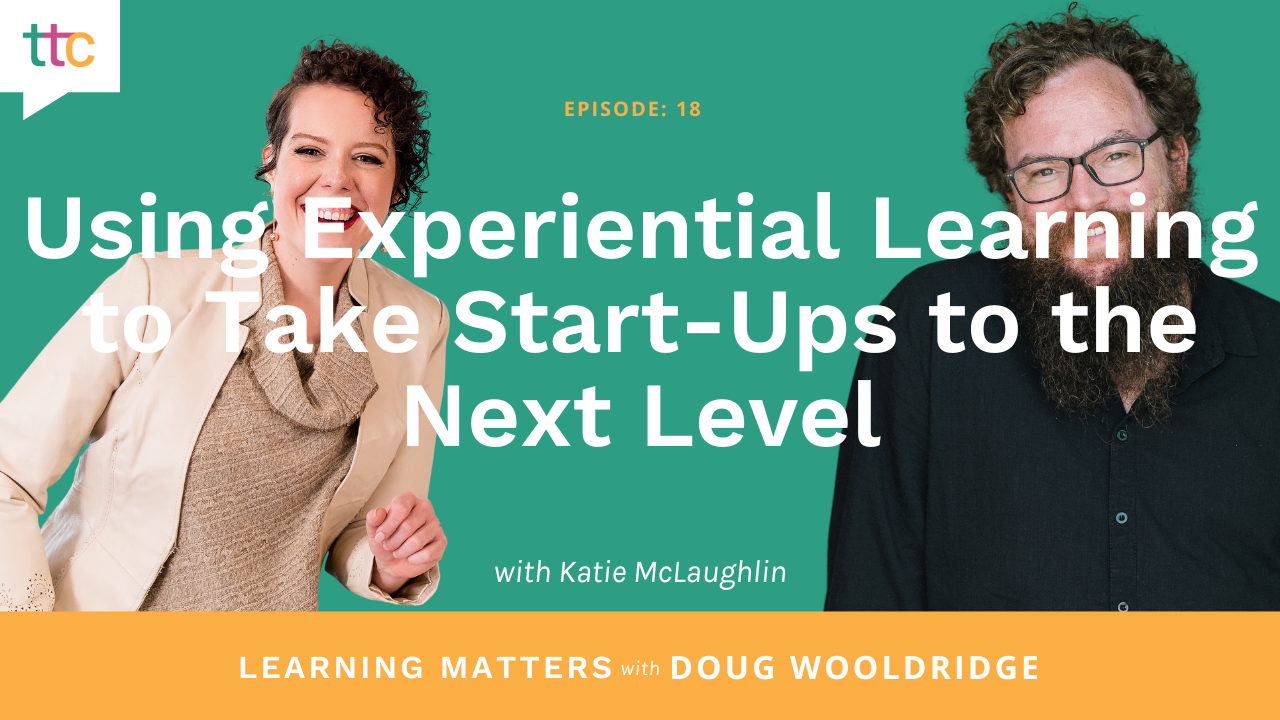Apple Podcasts | Spotify | YouTube
This week, we’re excited to chat with Katie McLaughlin about the McLaughlin Method and the magic of experiential learning and corporate training. Katie’s journey into adult learning began when she realized how powerful theater techniques could be for creating engaging and immersive learning experiences. She blends her theatrical background with her expertise in adult learning principles, crafting interactive and memorable sessions that really resonate with people.
Katie wanted to make a lasting impact, so she took the plunge and started her own consulting business. This allowed her to dive headfirst into her passion for adult learning and help individuals and organizations reach their full potential. Her personalized approach and commitment to creating safe, engaging learning environments have made her a trusted partner for clients looking to unlock the power of their workforce and promote continuous learning and development.
Integrating Theater Techniques in Learning
Katie has discovered that using theater techniques in her adult learning programs significantly boosts engagement and retention. Thanks to her background in theater and love for experiential learning, she’s developed some pretty innovative methods that tap into the power of storytelling, improvisation, and embodied learning.
One of her key techniques is role-playing exercises. By stepping into different characters and scenarios, participants can explore complex situations from multiple perspectives, fostering empathy and critical thinking. These immersive experiences create a safe space for learners to experiment, make mistakes, and get constructive feedback without any real-world consequences.
Katie also uses improvisation techniques to encourage spontaneity, active listening, and collaboration among participants. Improv exercises not only break the ice but also push individuals to think on their feet, respond to unexpected situations, and build on each other’s ideas. This dynamic approach mirrors the ever-changing modern workplace, helping learners adapt and thrive in uncertain environments.
Storytelling is another powerful tool in Katie’s arsenal. By crafting compelling narratives around learning objectives, she taps into our universal human connection to stories, making the content more relatable, memorable, and emotionally resonant. Participants are encouraged to share their own stories, fostering a sense of community and mutual understanding within the learning environment.
By seamlessly blending these theater techniques with adult learning principles, Katie creates highly engaging and transformative learning experiences. Participants not only gain new knowledge and skills but also develop a deeper sense of self-awareness, emotional intelligence, and interpersonal effectiveness – invaluable assets in today’s dynamic professional landscape.
Creating a Safe Learning Environment
Creating a safe and inclusive environment is crucial for effective adult learning. Katie knows this well and prioritizes fostering a space that encourages vulnerability, exploration, and growth.
She emphasizes the importance of setting clear ground rules and establishing a respectful, non-judgmental atmosphere right from the start. This involves actively listening to participants, acknowledging their perspectives, and validating their experiences. By creating an environment where individuals feel heard and valued, they’re more likely to engage authentically and embrace the learning journey.
Katie uses techniques that promote psychological safety, encouraging participants to share their thoughts and feelings without fear of ridicule or criticism. This enhances trust and openness within the group, facilitating deeper learning and personal growth.
Katie understands that adult learners often come with preconceived notions, biases, or past experiences that might hinder their ability to fully embrace new concepts or perspectives. By fostering a safe and supportive environment, she aims to break down these barriers, allowing participants to challenge their assumptions, explore new ideas, and ultimately transform their mindsets.
The Role of Conflict Resolution
Conflicts are inevitable in any organization. Differing perspectives, miscommunications, and competing priorities can lead to tensions and disagreements. Katie’s approach to conflict resolution emphasizes empathy, clear expectations, and support.
Katie believes conflict can be a catalyst for growth and positive change when handled constructively. She creates a safe space for open dialogue, where individuals feel comfortable expressing their concerns and viewpoints without fear of judgment or retaliation.
Through her facilitation techniques, Katie encourages participants to actively listen to one another, seek to understand different perspectives, and find common ground. She helps them identify the underlying issues and root causes of conflicts, rather than just focusing on surface-level disagreements.
Katie’s theater background is a big asset in her conflict resolution approach. She uses role-playing exercises and scenario-based activities, allowing participants to step into different roles and gain a deeper understanding of the various perspectives involved.
Ultimately, Katie aims to foster a culture of support and collaboration within organizations. She believes that by addressing conflicts constructively, organizations can strengthen relationships, build trust, and create an environment where diverse perspectives are valued and leveraged for collective success.
Understanding Organizational Culture
Organizational culture is key to shaping the overall employee experience and driving performance within a company. It encompasses the shared values, beliefs, and behaviors that collectively define an organization’s identity and guide its operations. A strong, positive culture fosters an environment where clear expectations, empathy, and support are deeply ingrained, leading to higher employee engagement and productivity.
Clear expectations are the foundation of a healthy organizational culture. When employees know what’s expected of them and what success looks like, they can align their efforts and focus on achieving those goals. Ambiguity and uncertainty can breed frustration and disengagement, hindering progress and innovation. By establishing transparent and well-defined expectations, organizations empower their workforce to take ownership and contribute meaningfully to the company’s vision.
Empathy is a critical component of a thriving organizational culture. It involves actively listening to and understanding the perspectives, challenges, and needs of employees. When individuals feel heard and valued, they’re more likely to feel a sense of belonging and commitment to the organization. Empathetic leaders and colleagues create an atmosphere of trust and psychological safety, encouraging open communication and fostering an environment where ideas can flourish.
Support is equally essential in cultivating a positive organizational culture. Employees who receive the necessary resources, training, and guidance to succeed are more likely to feel motivated and engaged in their roles. This support can take various forms, such as professional development opportunities, mentorship programs, or access to the tools and technologies needed to perform their duties effectively. By investing in their employees’ growth and well-being, organizations demonstrate their commitment to their workforce and foster a culture of continuous learning and improvement.
A culture that prioritizes clear expectations, empathy, and support creates a powerful synergy that drives employee engagement and performance. When individuals feel valued, understood, and supported, they’re more likely to go the extra mile, contribute innovative ideas, and remain loyal to the organization. Ultimately, a strong organizational culture serves as a competitive advantage, attracting and retaining top talent while fostering an environment where employees can thrive and contribute to the company’s success.






